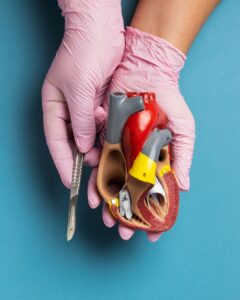Organ Damage After Auto Accidents: Symptoms, Risks, And Treatment Options
When people think of auto accidents, broken bones and visible injuries usually come to mind. However, one of the most dangerous and often overlooked consequences of car crashes is internal organ damage. Since symptoms are not always immediate, delayed diagnosis can put lives at risk. At Specialty Care Clinics, our specialists are trained to detect and treat these hidden injuries, ensuring patients receive timely and effective care.

How Auto Accidents Cause Organ Damage
The sudden force of a collision can cause organs to be compressed, punctured, or torn. This can occur from:
- Blunt Force Trauma – When the body strikes the steering wheel, dashboard, or seatbelt.
- Penetrating Trauma – When broken glass, debris, or fractured bones puncture an organ.
- Rapid Deceleration – Internal organs shift within the body, leading to tearing or bleeding.
These injuries can affect vital organs such as the liver, spleen, kidneys, lungs, and heart, making early medical evaluation critical.
Common Types Of Organ Damage After Auto Accidents
- Liver Injuries – Can cause severe internal bleeding and abdominal pain.
- Spleen Ruptures – One of the most common life-threatening injuries, often requiring surgery.
- Kidney Damage – Leads to blood in urine, lower back pain, and potential long-term complications.
- Lung Injuries – Including collapsed lung (pneumothorax) or bruising (pulmonary contusion).
- Heart Trauma – May result in abnormal heart rhythms or cardiac arrest.
- Bowel and Stomach Damage – Can cause internal bleeding or infection from leakage of intestinal contents.
Warning Signs And Symptoms Of Organ Damage
Organ damage is not always obvious immediately after an accident. Watch for these red flags:
- Severe or persistent abdominal pain
- Difficulty breathing or chest pain
- Dizziness, fainting, or signs of shock
- Blood in urine, stool, or vomit
- Distended abdomen or swelling
- Pale, clammy skin
Even mild symptoms should not be ignored after an accident. Seeking care at an auto injury treatment center is vital to rule out hidden damage.
How Doctors Diagnose Organ Damage
At Specialty Care Clinics, we use a combination of clinical evaluation and advanced imaging to identify internal organ injuries:
- Ultrasound (FAST Exam) – Quickly detects internal bleeding.
- CT Scans – Provide detailed imaging of organs and abdominal structures.
- X-Rays – Identify fractures that may cause secondary organ damage.
- Blood Tests – Assess internal bleeding and organ function.
Prompt diagnosis can mean the difference between a smooth recovery and life-threatening complications.
Treatment Options For Organ Damage
Treatment depends on the severity and location of the injury. Common approaches include:
- Observation & Monitoring – Minor injuries may heal with rest and close monitoring.
- Medication – Pain relievers, antibiotics, and drugs to stabilize vital signs
- Surgical Repair – Required in cases of ruptured spleen, bowel tears, or severe bleeding.
- Minimally Invasive Procedures – Such as laparoscopic surgery for certain abdominal injuries.
- Rehabilitation & Follow-Up – Helps patients regain strength and prevents long-term complications.
Our auto injury clinics in Texas provide personalized recovery plans tailored to each patient’s needs.
Risks Of Untreated Organ Damage
Ignoring or delaying treatment for internal injuries can lead to:
- Severe blood loss and shock
- Permanent organ failure
- Life-threatening infections (sepsis)
- Long-term disability or death
This makes early detection and immediate medical intervention absolutely essential.
Why Choose Specialty Care Clinics?
At Specialty Care Clinics, we provide:
- State-of-the-art diagnostic imaging
- Experienced trauma and emergency care specialists
- Comprehensive rehabilitation programs
- Compassionate, patient-centered care
Our goal is to ensure accident victims receive complete and effective treatment, from initial evaluation to long-term recovery.
Conclusion
Organ damage after auto accidents is often hidden but can be life-threatening if left untreated. Recognizing the warning signs, seeking prompt medical care, and following through with treatment are critical steps to recovery.
At Specialty Care Clinics, our expert team provides advanced care for auto accident organ injuries, helping patients regain health and peace of mind.
FAQs About Organ Damage After Auto Accidents
- Which Organ Is Most Commonly Injured In A Car Accident?
The spleen and liver are the most frequently injured due to their location in the abdomen. - Can Organ Damage Heal On Its Own?
Some minor injuries may heal with rest, but many require medical or surgical intervention. - How Soon Do Symptoms Appear After An Accident?
Symptoms can appear immediately or may be delayed for hours to days, making early evaluation crucial. - Is Surgery Always Required For Organ Damage?
Not always—treatment depends on the severity of the injury. Some cases heal with monitoring. - Where Can I Get The Best Treatment For Organ Damage After A Car Accident In Texas?
At Specialty Care Clinics, we provide expert diagnosis, treatment, and rehabilitation for all accident-related injuries.
